Seasonal Flu Shot FAQ

Fall and winter weather don’t only bring cooler weather, but also flu season. In addition to preventative measures like staying home when sick, covering your cough, and washing your hands, flu shots are a safe and effective way to reduce your chances of getting seriously ill with influenza.
Here are answers to some of our most frequently asked questions about the flu vaccine:
Q: Why should people get their seasonal flu shot?
A: Having the flu can mean feeling under the weather for a few days, or it can result in serious illness. Vaccination is the best way to protect yourself (and those around you) from getting the flu.
With COVID-19 also circulating, it’s more important than ever to protect yourself. Flu vaccinations play a key role in keeping our whole community healthier and reducing the burden on our healthcare systems.
Q: Can a flu vaccine give you flu?
A: No, flu vaccines cannot cause flu illness.
Flu shots are made with either inactivated viruses or with only a single protein from the flu virus. The nasal spray flu vaccine contains attenuated (weakened) live viruses so that they will not cause illness.
Q: Does the flu shot weaken your immune system?
A: No. The flu shot does not weaken your immune system or make you more likely to get the flu. Getting your annual flu shot prepares your immune system to fight off the flu.
Q: Is it better to get sick with flu than to get a flu vaccine?
A: No. The flu can be a serious disease. Young children, older adults, and people with certain chronic health conditions, such as asthma, heart disease, or diabetes are at high risk for flu complications.
Anyone can experience complications, hospitalization, or death, not just individuals who are at risk. Getting your annual flu shot is a safer choice than risking illness.
Q: Do I need to get a flu vaccine every year?
A: Yes. It is recommended that everyone 6 months of age and older (with rare exceptions) receive an annual flu shot.
The protection received from flu vaccination declines over time. Getting a flu shot every year provides the best protection against the flu. Also, flu viruses are constantly changing. Flu vaccines are updated as needed based on which flu virus is going around.
Q: What about people who get a seasonal flu vaccine and still get sick with flu symptoms?
A: There are a few reasons why someone might get flu symptoms, even after they’ve received their annual flu shot.
1. People can become ill from other respiratory illnesses, such as rhinoviruses, that cause symptoms similar to the flu and spread during flu season. The flu vaccine does not protect against other illnesses, only influenza.
2. It takes two weeks after you’ve received your flu shot for your body to develop protection. Individuals may become sick with the flu if they were exposed to flu viruses before or shortly after receiving their flu shot, as the vaccination did not have enough time to take effect.
3. As mentioned before, flu viruses are constantly changing and flu vaccines are updated based on which flu virus is going around. Individuals may have been exposed to a flu virus that is different from the viruses the vaccine is designed to protect against. There are many different flu viruses that spread and cause illness among people.
Flu vaccines vary in how well they work. This means that some people who do receive a flu shot will still get sick. Although some individuals may still get sick with the flu, flu vaccines have been shown to reduce the severity of illness in people who still get sick.
Q: Does getting a flu vaccination increase your risk of COVID-19?
A: No. There is no evidence that getting your annual flu vaccination increases your risk of getting sick from a coronavirus, like the one that causes COVID-19.
Q: Can I get my flu vaccine at the same time as my COVID-19 vaccine or booster?
A: Yes. The CDC recommends both flu shots and COVID-19 vaccines for those 6 months and older. If you’re due for both, you can get them at the same time. Just book one appointment slot and indicate on your patient form that you’d like to receive both shots. Some people prefer to get a shot in each arm to reduce discomfort.
Q: Can seasonal flu vaccines or pneumonia vaccines protect you against COVID-19?
A: No. Vaccines that protect you against the seasonal flu or pneumonia do not provide protection against COVID-19. COVID-19 is a different virus with its own vaccine.
Sources:
CDC
Association of State and Territorial Health Officials
Public Health Communications Collaborative
Archives
- July 2025 (1)
- June 2025 (3)
- April 2025 (2)
- February 2025 (1)
- January 2025 (2)
- December 2024 (1)
- September 2024 (2)
- August 2024 (2)
- July 2024 (1)
- June 2024 (1)
- February 2024 (1)
- July 2023 (1)
- March 2023 (1)
- October 2022 (1)
- September 2022 (1)
- August 2022 (1)
- July 2022 (2)
- June 2022 (2)
- May 2022 (1)
- April 2022 (4)
- March 2022 (1)
- February 2022 (1)
- January 2022 (2)
- December 2021 (4)
- November 2021 (3)
- September 2021 (2)
- August 2021 (3)
- July 2021 (2)
- June 2021 (1)
- May 2021 (2)
- March 2021 (1)
- December 2020 (6)
- November 2020 (8)
- October 2020 (4)
- September 2020 (7)
- August 2020 (3)
- July 2020 (11)
- May 2020 (2)
- April 2020 (4)
- March 2020 (1)
Categories
- Communicable Disease (4)
- Clinical Services (18)
- Clinical Servcies (1)
- Health Promotions (72)
- Emergency Preparedness (8)





